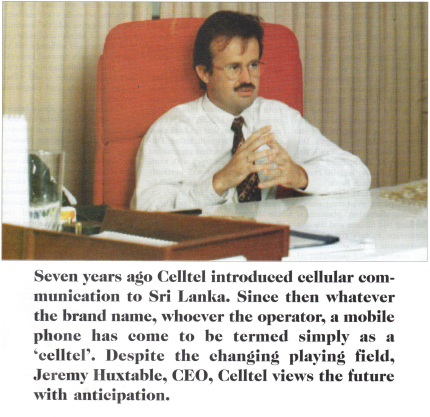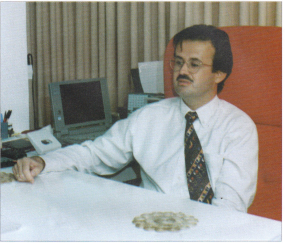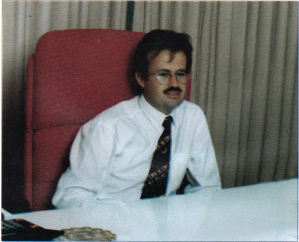Seven years ago Celltel broke new ground in Sri Lanka by becoming the first private telecommunications operator offering cellular phone services. Today they service 33,000 customers and have the widest coverage in the country extending as far as Kataragama in the south, Puttalam in the north west and Anuradhapura, Dambulla and Badulla in the central areas of the country.

At present the CEO of Celltel is Jeremy Huxtable, an affable Englishman whose previous experience includes ten years with DHL based in Saudi Arabia and Pakistan. Recalling the beginnings of Celltel in Sri Lanka Huxtable says, ‘we were catering for an up market group, it’s the same in any country when you begin a cellular operation. The first people who require it are the top 2 percent of the population. As time goes on like with all products the life cycle of the product extends and the price comes down and today the cell phone is a consumer product.”
As he points out, today even the trishaw driver owns a cellular phone. He feels Sri Lanka was quick to adopt this new communications technology and consequently we have jumped a whole phase and this has been the case in many Asian countries. In the West one necessarily went from a fixed home phone to a mobile, but this has not been the case here.
The trend in Sri Lanka now is towards smaller less obtrusive phones unlike in the beginning when it was something of a status symbol and people wanted to show off their phones which were bigger, bulkier models back then.
Huxtable says at Celltel they see a whole range of people coming in to buy phones which indicates how the cellular phone has permeated all levels of society. “Most of our communication is in
Sinhala and more and more of our customers are asking us to produce bills in Sinhala and we hope to have at least the written part in Sinhala and Tamil by the middle of the year.”
Celltel dominated the market for about three years following commencement of operations here, after which the competition came in a rush. Huxtable feels that for a country this size and with the potential market that exists here, four operators probably are too many; two companies would be quite effective in a market like this and the consumer would still have a choice. From the pricing point of view he states that only Vietnam, Singapore and Pakistan have cheaper rates.
The company still maintains nearly 50 percent of the market share and sells twice as many phones as its nearest competitor. Their biggest advantage however is that they have great brand equity. It doesn’t matter whose phone it is, it’s generally called a ‘celltel’! Despite being market leaders Celltel believes strongly in advertising particularly with four players on the scene and they are therefore quite aggressive in their approach.

Strangely woman phone owners account for only 2 percent of their customers and according to Huxtable this is surprising considering how many women are involved in business in this country.
How does Celltel feel about the arrival of two new companies, namely Suntel and Lanka Bell into the telecommunications arena? Huxtable is pretty nonplussed. ‘I think they compete in a different market. The more telephone lines the country has, the better for everyone.” The only reservation I have is that it becomes imperative for the government and the regulator to become much stronger. It has to be equal for all. You can’t have one deal for one sector of the telecommunications industry and another deal for another. But I think the regulatory environment here is growing very well; the move to make it more independent is very positive. However he feels the two new operators might find it harder
than they thought. While he acknowledges that rates for a ‘nor, mal’ phone are cheaper, he has no doubts about the attraction and convenience of a cellular phone being the deciding factor for many people for whom mobility is vital.
When it comes to customer care the guiding principle at Celltel is to deliver a high quality service that is appropriate and consistent. Consistency is important because as Huxtable points out the worst thing is to have a good experience with an organisation once and then to have a bad experience the next time. Quality service can be repetitive but similar every time you experience it.
The company’s current innovation is turning their branch offices into retail stores, called ‘Tele 1’, where they are developing the concept of the high street communications store which is common in other parts of the world. At present three such stores are operational in Chilaw, Nuwara Eliya and Kurunegala and by the middle of the year these stores will be online to the Colombo office. These
outlets will be on par with the head office, capable of handling all transactions. As Huxtable points out, ‘when you grow as rapidly as we have and you count 33,000 customers, there’s no way this many people can come to Union Place to pay their bills. So in or der to improve customer care we have to automate our systems very heavily from the computer point of view and ensure there are enough outlets where people need them to make purchases, pay bills, make inquiries etc.” The company is also encouraging people to do more. transactions over the phone rather than visit their offices.

Even though they are the market leaders, in a field of four players, advertising is important and Celltel maintains an aggressive presence. Their high profile now extends to active involvement in the sponsorship of sports activities, namely CR&FC Rugby and more recently theatre productions. For the last 3-4 years they have sponsored a children’s mini rugby camp which is very popular. Huxtable says Sri Lanka has been
very good to the company and they feel they should put something back into the community. Out of the thousands of requests they get for sponsorship they are attracted to projects which are interesting and different and which are driven by a committed group of people who share the same values as the company. As an innovative company they look for similar attributes in whatever they involve themselves in. Currently Celltel is sponsoring a theatrical production of Julius Caesar’- a 90’s version of Shakespeare’s classic tragedy, which will be on the boards in May.
Having been the pioneer in cellular communications in Sri Lanka, Huxtable says Celltel is very eager to penetrate the north and the east of the country. When the time comes and authorisation is given, he says they will be happy to assist in the reinstallation of telecommunications in these areas of the country.



